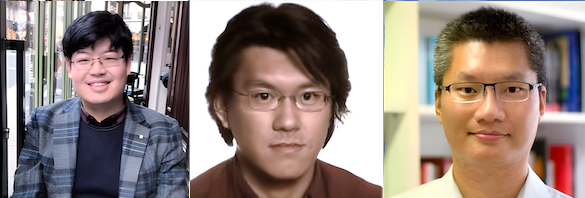
Award won:
- Kaid-Sanders Best Political Communication Article of the Year Award (2023)
Name(s) & affiliation:
- Greg Chih-Hsin Sheen (Assistant Research Fellow, Institute of Political Science, Academic Sinica)
- Hans H. Tung (Professor, Department of Political Science, National Taiwan University)
- Wen-Chin Wu (Associate Research Fellow, Institute of Political Science, Academic Sinica)
Project title:
- Power Sharing and Media Freedom in Dictatorships
Publication reference:
- Political Communication, 39:2, 202-221, DOI: 1080/10584609.2021.1988009
Tell us something about you/your team and how and why you decided to focus on this research
- Since 2017, we have worked together as a team to investigate various issues surrounding the politics of media freedom in dictatorships on both theoretical and empirical fronts. Up to now, we have collectively published more than five peer-review articles in academic journals. From the very beginning of our collaboration, we all felt there was a lack of enough theoretical discussions as well as solid empirical works on dictators’ commitment problem and how it affected media freedom in authoritarian regimes. Especially, there was a lacuna on how this problem played out in the intra-elite power sharing relationship under dictatorships. We therefore decided to embark on various projects that examined this question systematically.
In 280 characters or less, summarize the main takeaway of your project.
- The paper develops a new power-sharing theory of media freedom under dictatorships and demonstrates quantitatively that the level of (partial) media freedom in them goes up when the level of their intra-elite power sharing is higher.
What made this project a “polcomm project”?
- The media politics in dictatorships has received lots of scholarly attention among political communication scholars recently. The topics range from how citizens living under authoritarian regimes have their voices heard or banned on the internet to how media outlets and their reports affect political stability in these regimes. Our endeavor contributes to this larger “polcomm project” by endogenizing dictators’ decisions over media freedom to their power-sharing relationship with their political allies.
What was the most challenging part of this project? …& how did you overcome those challenges?
- The most challenging part of this project was to put together a dataset with all the variables needed to test our theoretical propositions. The vast majority of authoritarian countries are very opaque and testing our theoretical ideas nonetheless calls for measures of intra-elite interactions in them such as power sharing or elite cohesion. Thanks to several recent data collection projects on dictatorships and media freedom, we were able to overcome the challenge and find convincing evidence for our theory through thorogh quantitative analyses.
What other research do you currently see being done in this field and what would you like to see more of in the future?
- Currently, most research in the field of authoritarian politics of media has been centered around the interactions between different mechanics of information/media control and the corresponding state-society relations under dictatorships. Especially, the (partial) media freedom in them is predominantly viewed as its strategy for acquiring information about social reactions to their rule. What we would like to see more of in the future are several new avenues of research our research helps open up.
- First, while our analyses have taken the first step to disclose the effect of intra-elite power sharing on media freedom under dictatorships, the measures of media freedom in our paper are however all aggregate ones. Since different types of media outlets—e.g., print, broadcast, or internet—might actually have different effects in sustaining intra-elite communications and power-sharing, a natural next step will be more theoretical and empirical endeavors to identify such variegated effects of different media types. Relatedly, as the information and communication technology advances so quickly nowadays, we would also like to encourage the community to investigate how dictatorships with different state capacity adapt to it, not just for meeting new social demands but also for handling intra-elite power dynamics.
- Second, the findings from our research also add another layer to the recent discussions about digital authoritarianism that mainly focus on how dictators’ newly gained digital power over media freedom enables them to consolidate their social control. However, as far as the survival of an authoritarian regime is concerned, media control is never exclusively about social control, but also about how the regime manages the power sharing relationship among its political elites. More media control might actually undermine the very foundation on which its intra-elite cooperation is based. How do dictators strike a balance between these two objectives? We will need more theoretical investigations and data collections to answer this question.
What’s next? (Follow-up projects? Completely new direction?)
- Based on our previous publications on the authoritarian politics of media, we continue to broaden our scope of investigation in addition to the directions suggested above. First, based on our new game-theoretic publication where we investigate formally conditions under which the media engage in self-censorship even though the dictator tries to commit to media freedom (Journal of Theoretical Politics, forthcoming), we are designing a lab experiment to empirically test some of its predictions. Second, another collaborative project of ours focuses on how dictators choose between free media and other political institutions to maintain regime stability. This project is also based on the theoretical insights derived from our power sharing project. Finally, our third project tries to find individual-level determinants for ordinary citizens’ support for media censorship in democracies and support for media freedom in autocracies.
Awardee Interview: Kaid-Sanders Best Article of the Year (2023)
